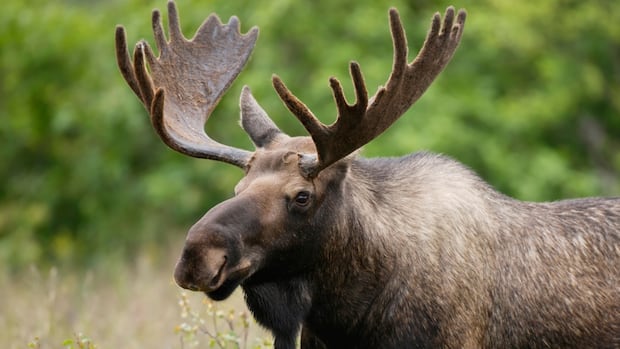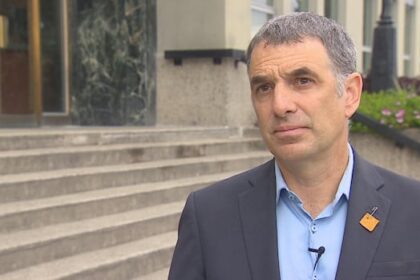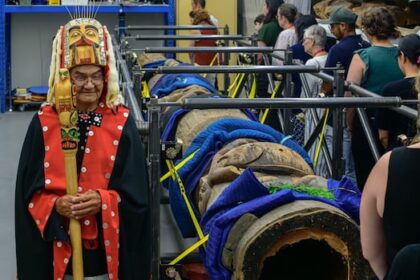ManitobaA Cree community in northern Manitoba is suing the province over its decision to issue moose hunting licences on its traditional territory this year, saying its members have effectively stopped hunting there due to population declines.Chief Heidi Cook worries moose decline may ‘lead to a complete inability’ to huntOzten Shebahkeget · CBC News · Posted: Sep 18, 2025 4:09 PM EDT | Last Updated: 4 hours agoMisipawistik Cree Nation is suing the Manitoba government for allegedly infringing on its treaty right to hunt moose for food and breaching the Crown’s obligation to consult, after the province boosted the number of licences issued in parts of its traditional territory earlier this year. (CBC)A Cree community in northern Manitoba is suing the province over its decision to issue moose hunting licences on its traditional territory this year, saying its members have effectively stopped hunting there due to population declines.Misipawistik Cree Nation, about 400 kilometres north of Winnipeg, accuses the province of infringing on its treaty right to hunt moose for food and of breaching the Crown’s obligation to consult, in a statement of claim filed at the Manitoba Court of King’s Bench on Wednesday.Earlier this year, Natural Resources Minister Ian Bushie said the province would grant a total of 350 moose hunting licences across four game hunting areas — including three that overlap with Misipawistik’s traditional territory: 10, 15 and 15A.The boost came after the province sparked fury from Pimicikamak Cree Nation and the Manitoba Wildlife Federation in 2023 with a 75 per cent cut to the number of moose draw hunting licences for Manitoba residents — from a total of 400 to 100 — across the four areas.Misipawistik Chief Heidi Cook says complete hunting closures in some areas have forced non-Indigenous hunters further north to compete with First Nations moose hunters.”I’m concerned that the way that the province is managing the moose is going to lead to a complete inability for our people to hunt for our food needs,” she told CBC News on Thursday.None of the allegations have been proven in court, and a statement of defence has not yet been filed.First Nations have a constitutionally protected right of top priority to hunt, fish, trap and gather food, and treaty-based hunters are not subject to hunting seasons or bag limits.The 350 moose licences the province issued included 62 bull moose tags — each shared between two licensed hunters — in game hunting area 10 and six tags in areas 15 and 15A, the lawsuit says.Misipawistik said it learned of the province’s licensing decision through a letter from Bushie a week after licence applications opened, but he did not explain how the allocations were expected to be sustainable or whether Misipawistik’s treaty rights were considered.Cook says the number of moose tags is unsustainable, because it represents the majority of the bull moose in the impacted areas.’Resource of all Manitobans’: PremierBoth Bushie and Premier Wab Kinew declined to comment on the lawsuit on Thursday because the matter is currently before the court.However, Kinew did comment on Bloodvein First Nation’s attempt to prevent licensed hunters from harvesting on its traditional territory, which led the province to create a buffer zone in the region earlier this week.”The moose is a resource of all Manitobans — that’s the position of our government,” Kinew said at an unrelated news conference Thursday.Misipawistik Cree Nation Chief Heidi Cook doesn’t think non-Indigenous hunters are to blame for moose population declines, but says predators and habitat loss are major contributors. (Submitted by Heidi Cook)Misipawistik says it has been warning Manitoba of low rates of moose hunting success in its traditional territory since 2024 and has also financially supported its members’ travel to Saskatchewan to hunt moose since 2022, the suit says.A 2019 big game survey by the province found the moose population in game hunting area 15 had likely declined.Misipawistik has a guardian program that allows experienced land users in the community to gather data on moose in the area and prevent poaching, Cook said.Between 2011 and 2017, Misipawistik hunters harvested 17 to 22 moose a year in the community, but that number dropped to less than five moose from 2018 to 2024, the lawsuit claims.The community needs 29 to 55 bull moose per year to meet the food needs of its on-reserve members, the suit says.’Our own backyard’Cook doesn’t think non-Indigenous hunters are to blame for moose population declines.”There’s a variety of factors that are leading to the population decline, and I think habitat loss and predation also plays a big part,” she said.Moose meat is a source of physical, emotional and spiritual nourishment to Misipawistik’s members, Cook said.”There’s nothing that makes you feel loved more than somebody sharing a bag of moose meat with you when they have a successful harvest,” she said. “It’s an important part of maintaining relationships, good health and our culture as a people.”But moose hunting in Saskatchewan is not a viable long-term solution for Misipawistik, because it’s costly and their diet differs from Manitoba moose, Cook said.”They taste different because they eat different food,” she said. “What we need to do is take care of our own backyard to ensure that our people will be able to continue to feed ourselves and to have a bountiful moose population.”The suit claims Manitoba’s 2025 licensing decision showed the province chose “political expediency” over its duty to fulfil the Crown’s treaty promise to Misipawistik.The decision also lacks “scientifically defensible data,” as the province has not kept reliable or consistent data despite having received warnings of declining moose populations in Misipawistik since at least 1985, the suit alleges.Direction from the court is needed to correct Bushie’s “bald refusal” to uphold Manitoba’s constitutional responsibility to protect Misipawistik’s right to hunt moose for food, the suit says.It also seeks a declaration that Manitoba must give top priority to Misipawistik’s treaty right to hunt for moose before allocating licences in the affected game hunting areas.ABOUT THE AUTHORÖzten Shebahkeget is a member of Northwest Angle 33 First Nation who grew up in Winnipeg’s North End. She has been writing for CBC Manitoba since 2022. She holds an undergraduate degree in English literature and a master’s in writing.Email: ozten.shebahkeget@cbc.ca
Thursday, 5 Feb 2026
Canada – The Illusion
Search
Have an existing account?
Sign In
© 2022 Foxiz News Network. Ruby Design Company. All Rights Reserved.
You May also Like
- More News:
- history
- Standing Bear Network
- John Gonzalez
- ᐊᔭᐦᑊ ayahp — It happened
- Creation
- Beneath the Water
- Olympic gold medal
- Jim Thorpe
- type O blood
- the bringer of life
- Raven
- Wás’agi
- NoiseCat
- 'Sugarcane'
- The rivers still sing
- ᑲᓂᐸᐏᐟ ᒪᐢᑿ
- ᐅᑳᐤ okâw — We remember
- ᐊᓂᓈᐯᐃᐧᐣ aninâpêwin — Truth
- This is what it means to be human.
- Nokoma











